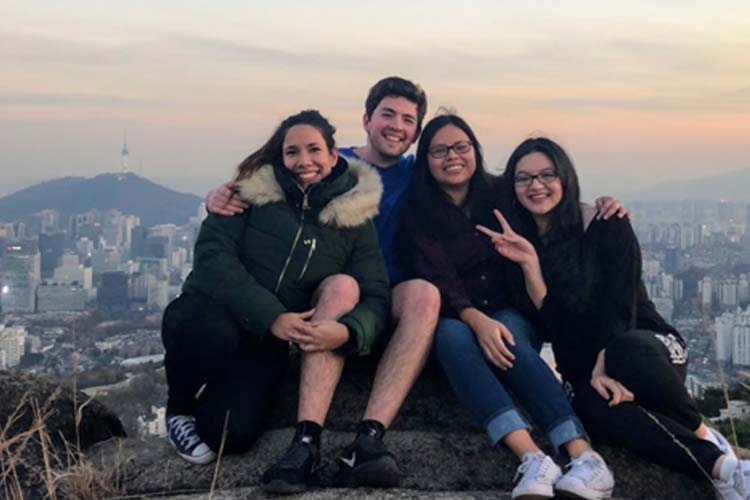I Want to Study Abroad
But, what about the Coronavirus?
I know, I know, we are in the middle of a pandemic and studying abroad probably does not sound like the best idea right now. However, do not lose sight of your goal if it’s to study abroad! Fortunately, a vaccine will likely become available sometime in 2021 and more and more countries seem to be doing a better job of keeping the numbers of new infections low. With that being said, I think it’s likely that by 2022 (or even earlier!) most things will get back to the way it was before COVID, including travel & studying abroad!

Manuel Garza, second on the left, Senior, Architecture Major
Where do I start?
Research, research, research. Start by gathering information. A good place to start your research is with our Office of Global Education, their website is filled with the locations and descriptions of all the programs they offer – you’re bound to find at least one that suits your interests. Have questions? Ask! Make an appointment with either a professional staff member or a peer advisor. Also, don’t limit your options to those provided through CU Denver, you can find more information and programs through third-party intermediaries that work with CU Denver, such as the American Institute for Foreign Study (AIFS), Council on International Education Exchange (CIEE), and International Studies Abroad (ISA), just to name a few. The opportunities are virtually infinite!
Do not let cost be a barrier!
Studying abroad is famous for being a rather costly experience and it definitely can be, but it is not always the case! You can find many programs that cost around the same or even less than what you are expected to pay for studying at a university in the United States. Take it from me, the total cost (program, airfare, food, lodging, basically every other expense) of the program I went to, cost me virtually the same as if I had stayed here at CU Denver. On top of that, there are many scholarship opportunities (within CU Denver and third-party resources) that can make the program even more affordable! I definitely encourage you to check out ways to finance your desired study abroad program to prevent cost being a barrier to a life-changing experience!
How do I know where I want to go?
You can start searching for options based on your budget, interests, program (curriculum & courses), region, and so on. Based on my experience studying abroad for two semester at Korea University in Seoul, South Korea, my advice is to: figure out your desired amount of time to study abroad (do you want a semester-long program, two semesters, or something shorter like a summer or winter term?). The second thing I asked myself was: “Where do I want to study abroad?” I knew that I wanted to go somewhere far from North America and/or something that was not “Western.” Based on that rationale, a logical answer was Asia. After choosing the region I wanted to study abroad, my next thought process was to search for big cities because I love big cities and all the excitement that comes with it! I narrowed my choices down to a few places including Singapore, Shanghai, Seoul, and Tokyo. Then I compared programs, costs, and universities and chose Korea University in Seoul (definitely one of the best decisions that I have made in my life!)
I know where I want to study abroad, what should I do next?
Now that you have made up your mind about where to go, your next order of business is figuring out the rest of the details (financial aid, visas, program requirements, airfare, etc.). These details vary by provider and program, so I strongly recommend making multiple appointments with our Office of Global Education to be guided towards your next steps!